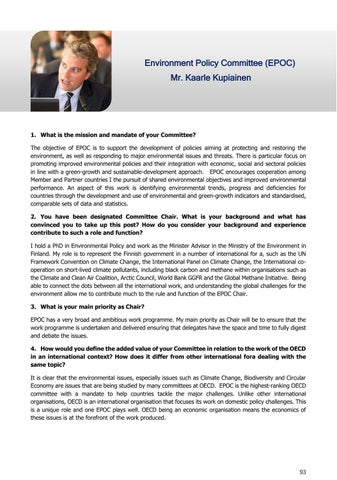Environment Policy Committee (EPOC) Mr. Kaarle Kupiainen
1. What is the mission and mandate of your Committee? The objective of EPOC is to support the development of policies aiming at protecting and restoring the environment, as well as responding to major environmental issues and threats. There is particular focus on promoting improved environmental policies and their integration with economic, social and sectoral policies in line with a green-growth and sustainable-development approach. EPOC encourages cooperation among Member and Partner countries I the pursuit of shared environmental objectives and improved environmental performance. An aspect of this work is identifying environmental trends, progress and deficiencies for countries through the development and use of environmental and green-growth indicators and standardised, comparable sets of data and statistics. 2. You have been designated Committee Chair. What is your background and what has convinced you to take up this post? How do you consider your background and experience contribute to such a role and function? I hold a PhD in Environmental Policy and work as the Minister Advisor in the Ministry of the Environment in Finland. My role is to represent the Finnish government in a number of international for a, such as the UN Framework Convention on Climate Change, the International Panel on Climate Change, the International cooperation on short-lived climate pollutants, including black carbon and methane within organisations such as the Climate and Clean Air Coalition, Arctic Council, World Bank GGFR and the Global Methane Initiative. Being able to connect the dots between all the international work, and understanding the global challenges for the environment allow me to contribute much to the rule and function of the EPOC Chair. 3. What is your main priority as Chair? EPOC has a very broad and ambitious work programme. My main priority as Chair will be to ensure that the work programme is undertaken and delivered ensuring that delegates have the space and time to fully digest and debate the issues. 4. How would you define the added value of your Committee in relation to the work of the OECD in an international context? How does it differ from other international fora dealing with the same topic? It is clear that the environmental issues, especially issues such as Climate Change, Biodiversity and Circular Economy are issues that are being studied by many committees at OECD. EPOC is the highest-ranking OECD committee with a mandate to help countries tackle the major challenges. Unlike other international organisations, OECD is an international organisation that focuses its work on domestic policy challenges. This is a unique role and one EPOC plays well. OECD being an economic organisation means the economics of these issues is at the forefront of the work produced.
93
















